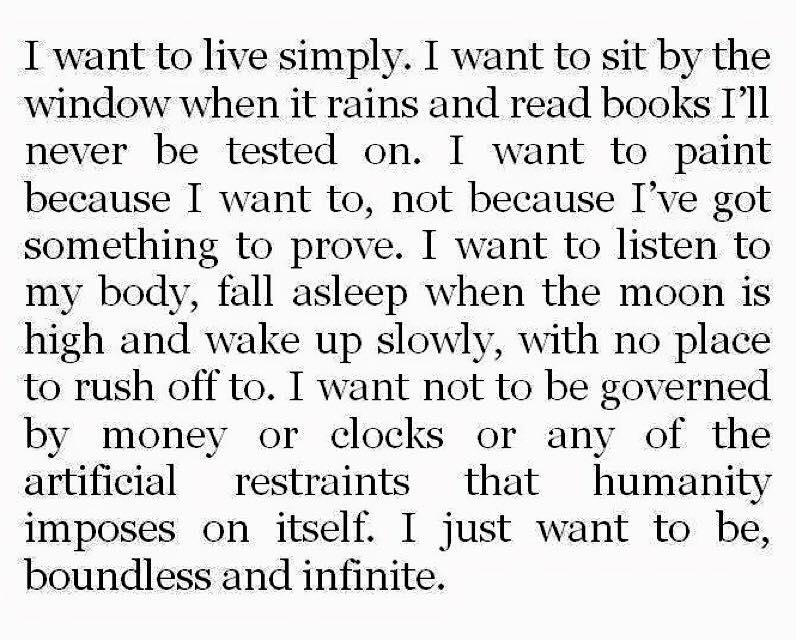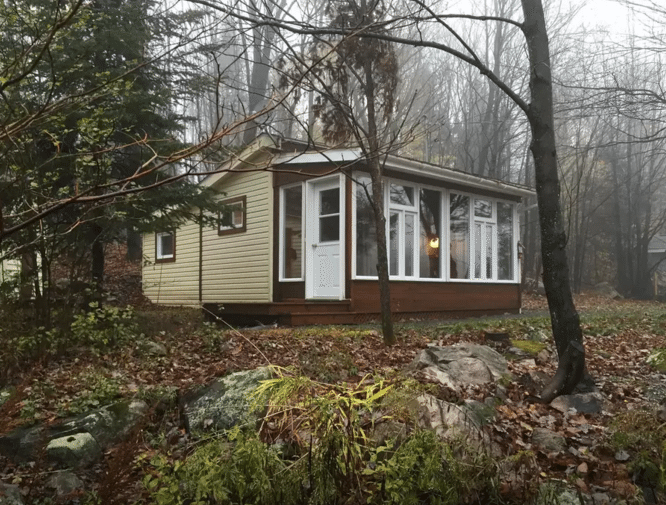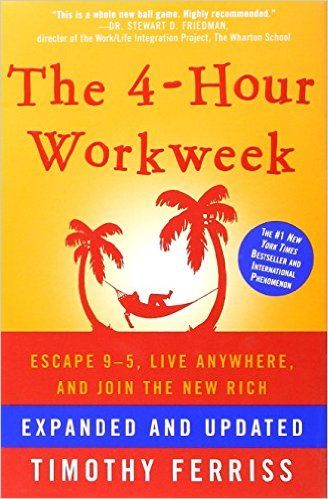Jordan Bates • • 12 min read
How to Escape the Rat Race and Live a Radically Free Life

I shared the following meme on my blog’s Facebook page a few weeks ago, and it received several hundred ‘likes’ and shares. It might be the most-shared piece of content I’ve ever posted to the page. Take a moment to read it:

The meme expresses what I might call a spiritual yearning for greater autonomy and for more time for leisure, relaxation, and free play. It seems that many people yearn to free themselves from a modern life that is characterized by endless structure, scheduling, bureaucracy, trivialities, and busyness.
Fascinatingly, many people who read this meme suggested that the life depicted — a life of significant autonomy, leisure, relaxation, and free play — is the substance of fantasy or a post-retirement destination. Several people responded with variations on “if only,” or “when I retire…,” or some other phrase expressing helpless longing.
In light of this response, it seems like it might be worth pointing out that living this sort of life is much more possible now than ever before.¹ So far, my life experience has served as strong evidence that if you make a high-autonomy lifestyle your overriding priority and are willing to make sacrifices and do unconventional things in order to attain it, it’s much more possible than you think.²
No Bosses, No Commutes, No Schedules, No Alarm Clocks
I’ve been earning a fairly modest income online since quitting my day job in September of 2015, but I’m finding it workable (so far), so long as I’m frugal and do my best to live where I can live cheaply. If money starts to become an issue, I can always head back to Southeast Asia, where I know I can get by on ~$400/month or so if I have to.
Read this: 10 Reasons You Should Never Get a Job
Having no boss, no commute, no schedules, and no alarm clocks basically allows me to live a close variation of the free-flowing lifestyle described in the meme I shared at the beginning of this post. I don’t say that to brag so much as to give you an idea of what is possible. I’ll be 25 next month. I work-play³ about ~25 hours per week for HighExistence (and another 5-15 hours on my personal projects). I go to sleep and wake up whenever I want. I set my own hours. I’m free to travel wherever I please. In a few days, I’m moving into a cabin on a commune/maple syrup farm about an hour outside Montreal, Canada. I’ll be living there for 3 months. I found the place on AirBnb and am paying just ~$470/month to live there.

Possibilities exist; find them if you want them badly enough — that’s kind of the moral of the story here.
In this post, I want to touch briefly upon two general routes one might take if one wanted more than anything (important because otherwise you probably won’t make it happen) to maximize autonomy and create plenty of time for leisure/relaxation/free play:
1. Become very frugal and self-reliant and buy a cheap tiny home, cabin, boat, or van.
Buy a modest patch of low-demand property somewhere for a good price, build a tiny home or some other low-cost, functional structure, and live very cheaply, perhaps growing some of your own food or doing other things to be as self-sufficient as possible.
You could also buy an already-built home, though this is probably more expensive (I’ve seen tiny homes for sale for ~$10-20k). I find this option quite attractive and am considering working toward something of the sort within the next few years, though who knows. Of course, one would likely still need some kind of income taking this route, but if one were able to get by on just a few hundred dollars per month, there are numerous ways one might go about earning that amount of money working part-time, doing odd jobs, doing online/freelance/remote work of some kind, or by starting some kind of business.
One might also consider buying and living out of a van or RV for a period of time. Those who would dismiss such an idea as hippie silliness are probably not dedicated enough to the idea of a high-autonomy/nomadic lifestyle to ever actually make it work. A big van would be pretty cozy; I don’t think it would be that hard to do, and I may try it at some point. I also know of folks who have purchased and live in sailboats, which is another decent option for a somewhat-affordable mobile home. Hell, you could even look into repurposing a bus.
The point of any one of these options is to stop paying rent. If there’s one thing that keeps people reliant on an endless cycle of working and spending, it’s rent (or mortgages or any sort of debt — eliminate debt at all costs and avoid it forevermore if possible). Many folks are paying upwards of $2,000/month for rent alone. This is absurd and keeps people completely dependent on their present situation. If one owns some sort of living quarters, however unconventional, this is a serious game-changer. At that point, all one needs to find money for is food, water, beer, electricity, and Internet (or whatever your necessities are; those are mine). Cutting out all unnecessary and luxurious expenses and learning to become frugal is the most efficient way to start living a simpler, higher-autonomy lifestyle.
2. Carve out some path of entrepreneurship/digital nomadism.
The other route, which I kind of alluded to (the two are complementary), is to find online/freelance/remote work that pays one a livable salary. This isn’t as difficult as it might seem, especially for those in affluent countries, as it is possible to move to/travel through countries in which the cost of living is much lower than in one’s home country.
Working online/remotely is pretty stelliferous for the reasons I described earlier: no bosses, no alarm clocks, no commutes, no schedules, ability to travel, etc. Though there is certainly a shadow side to the digital nomad lifestyle⁴, it currently suits me quite well, and I would recommend it to anyone who values autonomy as highly as I do.
It occurs to me that many people don’t really have any idea where to start when it comes to working online/remotely. For this reason, I’m going to go on a tangent to provide a synopsis of my understanding of how to earn a living online.
A Straightforward Summary of How to Earn Money Online
1. Gain relevant skills and hit the job websites hard.
The most realistic way to go about working online/remotely is to develop the kinds of skills that are in-demand in the online space and will be for the foreseeable future. Skills in the following areas (among others):
— graphic design
— writing
— programming
— marketing/copywriting
— search engine optimization
— social media marketing skills
One or more of these skills is probably going to be necessary to find online work, and having multiple of them is preferable. If you don’t have any of these skills, everyone has to start somewhere. The best way is to learn by diving in and doing.
NoExcuseList.com is a spectacular list of pretty much all of the best online education resources if you want to teach yourself a new skill. With the power of the Internet, you can teach yourself virtually anything nowadays. This is an important thing to understand, as your success working online will likely depend heavily on your ability to diligently teach yourself new things and apply them.
If you already possess one or more of the skills I listed, you might be able to find work. We Work Remotely and Working Nomads are a couple of job websites solely dedicated to job listings for remote/online work. There are many other sites like this. Google is your friend. Craigslist, Indeed, and other more traditional job sites also have plenty of listings for online/remote work. You should be willing to scour these websites for promising leads, and you should be well-versed in how to effectively play the job application game. If you aren’t, start doing some googling. This brief guide to applying for jobs from Wait But Why is one of the best succinct guides I’ve seen.
Teaching yourself relevant skills and hitting the job search like a hell-bent juggernaut is a reliable, systematic approach to finding online work. If you go this route and are very persistent, you will almost certainly find results.
2. Build awesome shit on the Internet and get lucky.
There are also riskier, less systematic ways to go about earning an income online. My original approach was to try to build a blog that people liked. I started my blog (which was actually like my fourth blog), Refine The Mind, under the assumption that if I found a lot of people who liked my writing, it wouldn’t be that hard to find a way to make money from the site. I dreamt of earning a living simply by writing what I wanted to write. Sites like Copyblogger and Problogger provided me with heaps of inspiration and useful knowledge about how to grow an audience and monetize a blog, and I recommend their resources.
Unfortunately, Refine The Mind has never made all that much money — definitely not enough to live on. I do still have aspirations to change that in time, but I have as yet been unable to successfully build a blogging business from scratch. However, my current job at HighExistence would not have been possible without all of the work I put into Refine The Mind. I got this job because Martijn, the co-founder of HE, really loved my writing and website. Had I not spent years blogging and eventually written a couple of guest articles for HE, he would never have known I existed.
There’s a lesson in this, I think, which is that the Internet has changed the world of work in profound ways. Whatever you build on the Internet is now just as much your resume as the piece of paper listing your work history. In many ways, it’s a better resume, as people can see plenty of examples of your work by which to judge your skill and expertise.
So, one roundabout way to end up working online/remotely is to build awesome shit on the Internet that catches other humans’ attention. I don’t necessarily recommend this route if it’s your sole strategy, but it’s a good thing to begin doing on the side, regardless of what line of work you’re in. Create a website/social media accounts and share your writing, drawings, photography, music, etc. Whatever it is, put it out there. You don’t know who’s going to find it and what opportunities might arise as a result. Like 2,000 years ago, the Roman philosopher Seneca said, “Luck is what happens when preparation meets opportunity.” I believe that ancient motherfucker was onto something.
3. Build an online business systematically.
I should note that there are more reliable, systematic approaches to building one’s own online business than the approach I pursued. One important thing to note is that I was never nearly as serious about building a business as I was about finding a readership. There’s a big difference between those two things. If you want to focus on building a business, I recommend reading through the archives of /r/entrepreneur for a while to get some ideas. That particular subreddit is a veritable diamond mine of insight into different avenues one might take to create a profitable business online.
The more systematic approach to building an online business, as evidenced by many people on /r/entrepreneur, is to focus first on finding a definite demand — something people really need, a niche itch that you know many people would like to have scratched — and designing a product or service specifically tailored to that demand. So rather than focusing on finding an audience first, you focus first on your product — what people are going to buy from you. There’s much more I could say on the topic of starting/running a business, but an in-depth guide is beyond the scope of this post. Again, I highly recommend diving into /r/entrepreneur. Reading Paul Graham’s classic essay, ‘How to Make Wealth,’ might also be a good idea.
Final Thoughts on Online Work
There are no real “Get Rich Quick” schemes in finding online/remote work or starting an online business. What it takes is persistence, a willingness to do the un-fun things, and an ability to approach things systematically/scientifically when the situation demands it. As I said before, if you want it badly enough, there are actually almost limitless ways to earn money and eventually earn a living on the Internet.
Some people buy and sell doodads and trinkets on eBay; some fill out surveys all day (some sites pay you for this); some get damn good at online poker; some sell their artwork on Instagram; some sell patronages for connoisseurs of rap music. With creativity, the stratosphere is the limit. Personally, I think the best way to go is to either start your own business venture(s) or develop a really desirable skill set that will allow you to work for an online company/website.
Again, without persistence, forget about it, man. There’s definitely a fairly steep learning curve in almost any direction you choose to go, but if you approach it with an insatiable curiosity and endless determination, you’ll likely enjoy the process and surprise yourself with the success you find in time. Patience is key too, but you have to balance patience with an ability to make things happen.
Working Abroad
Another thing I feel I should mention in this article is working abroad. Although many jobs overseas don’t necessarily allow for more autonomy than domestic jobs, such jobs are likely more interesting than many/most jobs in one’s home country and also give one the chance to travel the world and expand one’s worldview while earning money. If travel is one of the main things you feel you’d value about a high-autonomy lifestyle, working abroad is definitely something you should look into. This lifestyle isn’t for everyone, but for many people, I think it can be a more fulfilling, challenging, learningful, and exciting way to live and work than staying put in one’s home country.
Read this: 11 Takeaways From 8 Months of Unemployed Nomadism
For me, it certainly was. I was an English teacher in South Korea for one year immediately after finishing university, and it was the most enriching experience of my life. It also totally opened my mind to myriad possibilities for life and work that I had never considered previously, setting me on a path toward the nomadic/high-autonomy mode in which I’m currently operating.
If you’re interested in working abroad, teaching is one promising option, but it’s far from the only one. You might consider WWOOF, Peace Corps, HelpX, Workaway, working on a cruise ship, or finding some other odd job. For more ideas, here’s a guide I once wrote on the subject.
Concluding Thoughts
I think far more people could do the things I’ve mentioned here but are held back by fear, cognitive distortions, and lack of knowledge/realization of the feasibility of these options.
To clarify, I don’t fault anyone for living however they’re living. I don’t think the lifestyles I’ve described are inherently better than some other lifestyle, and I don’t think they’re for everyone. It isn’t all orgasms and star dust. There are trade-offs and sacrifices you will need to make if you want badly enough to live a high-autonomy lifestyle.
At least at this stage of my life, high-autonomy models of living seem to suit me much better than the day-job-centric model most people exist within, and I know many others feel similarly. That’s why I thought it would be useful to share these thoughts in response to the meme with which I opened this article. I hope you’ve found some useful food for thought in these words, anonymous friend from the Interwebz.
Now go forth, take care, and be free.
If you loved this post, you need to read The 4-Hour Workweek by Tim Ferriss.

If you appreciated this post, you’ll absolutely love The 4-Hour Workweek: Escape 9-5, Live Anywhere, and Join the New Rich by Tim Ferriss. Don’t let the cheesy title fool you; this is one of the most life-changing, paradigm-shifting books I’ve ever read. It’s the first book I recommend to aspiring world travelers, entrepreneurs, and digital nomads. The Bible of lifestyle design. Get it. Read it.
You can buy the book on Amazon or arm yourself with an entire library of similarly transformative books on the Stairway to Wisdom. Click on “About” for a free trial!
Footnotes:
- Except perhaps during periods of pre-history in which the human population was relatively low and everyone was a hunter-gatherer. It’s possible that during this time most people had a significant amount of free time and autonomy, though this is unclear.
- I say this as a single/childless American and recognize that what I’m suggesting is less attainable in other life contexts. Ideally I’d like to see high-autonomy lifestyles become feasible for all humans, but at this point that’s certainly not the case. I do not take this opportunity for granted, but rather try to learn as much as possible, share what I learn, and help others in the process.
- I’m not sure if anyone else has coined this term, or something similar. A quick Google search revealed nothing. It seems appropriate here, as I enjoy much of the work I do for HighExistence and engage regularly in imaginative play through my work. There are certainly other aspects of my job that are more tedious/laborious, but much of it feels like “work-play.” Alan Watts’ sentiment seems relevant: “This is the real secret of life — to be completely engaged with what you are doing in the here and now. And instead of calling it work, realize it is play.”
- I should make a distinction between working online/remotely and adopting a digital nomad lifestyle (working online while traveling the world). One can certainly do the former without doing the latter, and there might be good reasons to prefer a stationary lifestyle to a nomadic one. Again, though, many people who work online are attracted to the idea of travel, especially since they can live more cheaply abroad.

Jordan Bates
Jordan Bates is a lover of God, father, leadership coach, heart healer, writer, artist, and long-time co-creator of HighExistence. — www.jordanbates.life


![Seneca’s Groundless Fears: 11 Stoic Principles for Overcoming Panic [Video]](/content/images/size/w600/wp-content/uploads/2020/04/seneca.png)







